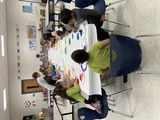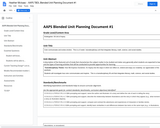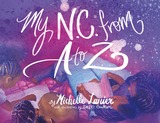
Students learn about primary and secondary colors and the order they fall in in the rainbow.
- Subject:
- Arts Education
- Visual Arts
- Material Type:
- Lesson Plan
- Provider:
- Incredible Art Department
- Author:
- Rebekah Poe
- Date Added:
- 02/26/2019

Students learn about primary and secondary colors and the order they fall in in the rainbow.

This lesson serves as a review for line, shape, color, and pattern for all students. The lesson also reinforces these concepts in english for ESL students. All students participate in speaking, writing and creating activities. Also, students are introduced to the NC Museum of Art through a virtual field trip.

Transdisciplinary Theme: How We Express Ourselves: An Inquiry into the ways in which we reflect on, extend and enjoy our creativity; our appreciation of the aesthetic.
Students will investigate how color communicates and inspires. This is a transdisciplinary IB unit that integrates literacy, math, science, and social studies.

Students will take on a mystery, Sherlock Holmes style, to uncover the secrets, history, and deeper meanings of Moyo Ogundipe's painting Soliloquy: Life's Fragile Fictions.
Students will be able to: explain why Ogundipe used particular colors, patterns, and images for his painting; discuss what the snakes and birds symbolize in the picture; and express in their own words at least three reasons the different elements of the painting are a treasure.

Students will put on their 'detective hats' and use magnifying glasses to find evidence that supports attributing the paintings in the Molleno Altar Screen to one artist and one piece. They will work in small groups and present a case to share with the entire class. They will also explore what would need to be different for them to prove that the pieces do not belong together.
Students will be able to: describe what an altar screen is; state that Molleno painted the scenes for this particular altar screen; develop and support a theory or hypothesis using details and logic; and share what they think and have learned with other students and the teacher.

This lesson focuses on the importance of recycling paper, color mixing, and learning secondary colors.

Students will compare the different styles of the artist Henri Matisse. Students will create a paper collage, drawing and painting while observing still-life scenes and real art work by Matisse.

Students will learn the primary colors, mixing primary colors for secondary, how to create basic geometric shapes from lines, experience a mixed media project and follow the style and technique of a famous painter (Piet Mondrian) in this lesson.

This lesson accompanies the North Carolina children's book, "My NC from A to Z" which celebrates pride of place, and creates connections to North Carolina's rich African American heritage. In this lesson, students will compare and contrast two to five North Carolina African American visual artists by making art and Venn diagrams.

Students will discuss secondary and primary colors using tactile and visual senses.

This free website provides more than 600 adaptable lesson plans written by teachers in collaboration with the Denver Art Museum for more than 130 objects from the museums world-class art collection. Lesson plans and resources focus on inspiring students to think and problem-solve creatively. Organized in an easy way so that teachers can pick the topic they would like to explore or enhance, then use works of art to teach that subject.
High resolution images are included. Museum visits are not necessary to implement lesson plans. Includes professional and student development tools such as teacher workshops and webinars, virtual classroom courses, career videos, educator blogs and creativity tools. Easy for teachers in language arts, social studies and visual arts to provide a curriculum rooted in the arts while also meeting 21st Century Skills.